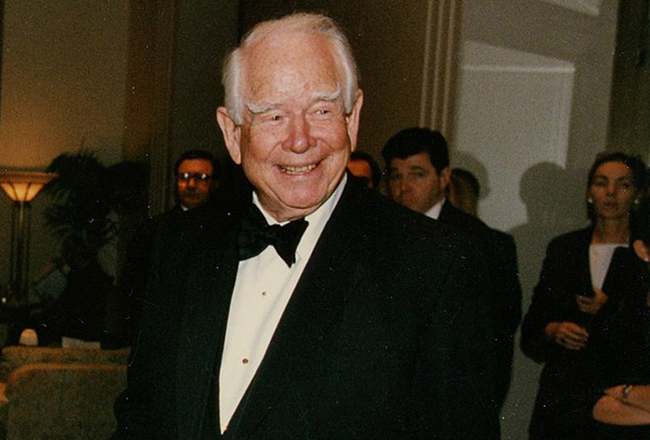Donald Kendall, who served as CEO of PepsiCo from 1963 through 1986 in a tenure marked with extraordinary success and more than a few controversies, passed away on Sept. 19 at the age of 99.
Born in Sequim, Washington, in 1921, the son of dairy farmers. He earned a sports scholarship to Western Kentucky State Teachers College in Bowling Green, but left school to become a U.S. Navy pilot in World War II, receiving the Distinguished Flying Cross.
After the war, he decided to jettison school in favor of working at a Pepsi-Cola bottling plant as a fountain syrup sales representative, eventually working his way up to leadership roles in the company”™s sales and marketing ranks.

Kendall first gained international attention in 1959 by setting up a Pepsi booth at the American National Exhibition, a diplomatic trade show in Moscow that became the setting of the so-called “kitchen debate” between Soviet leader Nikita Khrushchev and then-Vice President Richard Nixon.
In a major publicity coup, Nixon brought Khruschev to the Pepsi booth to taste the soft drink. In 1972, Kendall arranged for Pepsi to become the first U.S. consumer product sold directly in Soviet stores in turn for the distribution of the Russian Stolichnaya vodka in the U.S. market. Kendall would also be instrumental in bringing Pepsi products to China after the country resumed diplomatic relations with the U.S. in 1979.
Kendall was also responsible for breaking down racial barriers within corporate America”™s C-suite. In 1962, Kendall coordinated the hiring of Harvey C. Russell Jr. as the first African American to hold a vice president position within a major U.S. company. Despite calls by the Ku Klux Klan for a boycott of Pepsi, Kendall worked to bring more African Americans into the company”™s leadership roles. In 1986, the NAACP Legal Defense and Educational Fund honored him with the first Equal Justice Award, citing his commitment to workplace equality.
Kendall became CEO of Pepsi-Cola in 1963. The company merged two years later with Frito-Lay to become PepsiCo. Kendall led the company in the so-called “cola wars” against rival Coca-Cola, and he enjoyed being in the corporate spotlight but did not enjoy sharing it with others.
In 1973, he successfully forced Joan Crawford off the company”™s board of directors ”“ the Oscar-winning actress was the widow of former CEO and board chairman Alfred Steele and for many years was a very popular spokesperson for the company”™s Pepsi-Cola brand. Crawford reportedly referred to Kendall as “White Fang,” a reference to both his thick mane of white hair and his lupine-aggressive business tactics.
In the mid-1970s, Kendall was revealed to be instrumental in advocating for the Nixon administration to overthrow the government of Salvador Allende, a self-proclaimed Marxist who was elected president of Chile in 1970. Allende died of self-inflicted gunshot wounds during the 1973 military coup that led to the brutal 17-year regime of Gen. Augusto Pinochet. Kendall defended his actions, claiming Allende”™s government threatened PepsiCo”™s business operations in Chile.
“I don”™t care if you”™re a Republican, Democrat or a Holy Roller,” he said in a 1983 Wall Street Journal interview. “You”™ve got to make sure the company has a healthy economic and political environment in which to operate.”
Kendall, who oversaw the company”™s relocation from Manhattan to Purchase in 1970, was elected PepsiCo chairman in 1971 and served until 1991, five years after he stepped down as CEO. In his later years, he was active on the boards of several major corporations and nonprofits. The Donald M. Kendall Sculpture Gardens, a 45-piece collection at PepsiCo headquarters featuring the works of classical and modern art, was named in his honor.




















